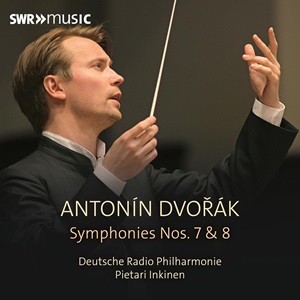
Antonín Dvořák (1841-1904)
Complete Symphonies Vol 6
Symphony No 7 in D minor, Op 70, B 141 (1885)
Symphony No 8 in G major, Op 88, B 163 (1889)
Deutsche Radio Philharmonie/Pietari Inkinen
rec. 2021 (No 7) and 2022 (No 8), Großer Sendesaal, Funkhaus Halberg, Saarbrücken, Germany
SWR Classic SWR19130CD [74]
The first two movements of the Seventh are each a minute faster than those of Jakub Hrůša, whose recording, coupled with Brahms’ Second Symphony, was designated as “Recommended” last November 2022 (review). But they are not as fast as Szell in the first movement and the finale; Inkinen is in fact similar to Suitner but a bit faster in the Scherzo. In other words, this is a middle-of-the-road reading. Hrůša is grander and statelier and his orchestra makes a weightier sound, which I prefer. The Poco adagio second movement flows serenely and the Scherzo skips attractively without exploring very thoroughly the more martial undertones Hrůša uncovers. To check my response, I played his immediately after Inkinen’s and immediately noticed a host of subtle little touches in phrasing, dynamics and rubato missing in this newer recording. Similarly, Inkinen’s finale proceeds gamely, but the horn opening lacks majesty, the stirring main theme a minute and a half into the movement lacks presence and impact and the soaring, folksy tune which succeeds it is a bit tame here. The coda, however, is rather good, finding the drive and expansiveness missing elsewhere.
Having found the Seventh understated, I feared to make comparison of the Eighth with Karajan’s last recording of it and indeed the opening sounds undernourished compared with the VPO’s sound; then the explanation hit me: somehow, Inkinen makes Dvořák sound like Sibelius – and as much as I love the symphonies of the Finnish master, a Bohemian character is not one of their most salient features. Again, to check, I played Karajan immediately after and ah, yes – there it was: that combination of rustic swing and weighty sonority which is essential to enlivening Dvořák’s music. The Adagio under Karajan has a kind of slinky seductiveness, enhanced by the VPO’s mellow woodwind; Inkinen plays it straight, rather classically – very nice, in fact, but not very interesting. The same is true of the lilting Allegretto grazioso Scherzo, which sounds considerably slower than Karajan’s even though the difference is only half a minute and comes over as foursquare and dull; there is insufficient differentiation in mood between the outer sections and the central Trio. The finale has plenty of momentum, coming alive at the speeding up of the main theme two minutes in, but the DRP trumpets do not have the brilliance of the VPO’s. Nor do their strings have that Viennese velour – and Karajan’s handling of the succession of variations demonstrates what a master conductor can do in with them, in contrast to a merely competent one. As with the Seventh, the coda is rousing and even raucous, but such excitement comes a little too late to redeem the whole.
The sound is very good, but I find that the nearly forty-year-old DG recording has greater depth, presence and brilliance.
This potentially attractive coupling is quite well played, but too low-key and lightweight, lacking in the personality and individual touches which animate my favourite versions.
Ralph Moore
Help us financially by purchasing from




















